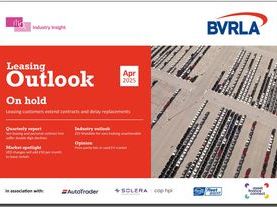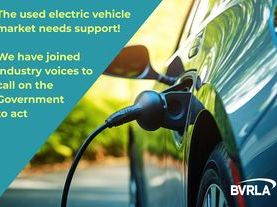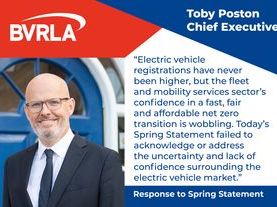Business leaders and sustainable transport campaigners have come together in urging the Chancellor to provide more financial support and incentives to support the zero emission van market.
In line with the recommendations from the BVRLA’s Van Plan, the letter to Rishi Sunak MP outlines the need to introduce targeted plans and funding that will support the uptake of electric vans across the 3.4 million people in the UK that require a van for their job[1]. The letter is co-signed by the BVRLA, BRC, Finance & Leasing Association, Green Alliance, Logistics UK, Renewable Energy Association, and Transport & Environment.
As the fastest-growing form of road transport, vans account for 16% of associated UK emissions[2]. However, there is a significant disparity between progress in the electric car and electric van markets. The lack of effective regulation or support for the electric van market means clear barriers remain that prevent fleet operators from making the transition. Lower running costs once incorporated into a fleet make electric vans an appealing option, but the initial costs to adopt are prohibitive to many. This is evidenced by the fact that the average electric van costs 31% more than its petrol or diesel equivalent. In many cases that price differential is over 50%[3].
Even though some larger operators have been able to invest the capital required to integrate electric vans into their fleets, and benefit from the lower running costs, cash-strapped smaller fleet operators and van drivers risk being left behind.
Whilst fleets support the target to phase out the sale of diesel vans by 2035, there are real barriers to switching to electric vans. Drivers have concerns over vehicle functionality, range and towing capacity, while there are also significant challenges regarding the UK’s charging infrastructure, where investment has been targeted at cars. Many on-street charging solutions are inaccessible to commercial vehicles, while drivers without a central hub in which to park and charge their vehicle overnight face further issues charging at home or risk prolonged periods of downtime during the working day.
BVRLA Chief Executive Gerry Keaney said: “Electric vans are the future, but for too long, the Government has focussed on one-size-fits-all solutions for electric vehicles. Zero emission vans are not yet affordable, accessible or feasible for many fleets and use cases. The sector needs a well-financed strategy with additional targeted fiscal support if we are to meet the 2030 phase out target. The measures laid out so far in the Transport Decarbonisation Plan and Net Zero Strategy do not go far enough.”
Nadiya Catel-Arutyunova, Sustainability Policy Advisor at the British Retail Consortium said: “Vans play a huge role in British society, especially for the retail industry, transporting food and goods to UK households every day. It’s therefore so important to ensure green fleet options are not only available but invested in. 90% of retailers have best practices in place to reduce current diesel Greenhouse Gas (GHG) emissions, but these actions alone are insufficient. Government has an integral role to play, not just in encouraging the take up of these technologies, but also in supporting further research and development in this to decarbonise van fleets in line with Government ambitions.”
Greg Archer, UK Director of Transport & Environment said, “Electric vans offer a clean solution for moving goods and equipment, but the supply and specification of the models available today is completely inadequate. The new ZEV mandate, announced as part of the Net Zero Strategy, must set targets that require van makers to increase the choice and availability of electric vans rapidly as part of a wider strategy to help and encourage businesses to make the transition from dirty diesel to clean electric.”
Dr Nina Skorupska CBE, Chief Executive of the Association for Renewable Energy and Clean Technology (REA), said: “During the Covid lockdown measures, it became obvious just how important vans are to our modern way of life. Left unsupported, vans on our roads could remain a significant source of carbon and pollutant emissions, even after the majority of the UK’s cars are powered by renewable electricity. Therefore, the REA stands beside the BVRLA in calling on the Government to do more to encourage and support the purchase and operation of zero-emission vans. This is critical if the UK is to meet its legally binding target to achieve net-zero carbon emissions by 2050.”
Signed by the BVRLA, BRC, Finance & Leasing Association, Green Alliance, Logistics UK, Renewable Energy Association, and Transport & Environment, the letter to Rishi Sunak MP outlines five core principles:
- Allocate additional ringfenced Plug-in Grant funding for the van sector beyond 2022/23
- Introduce new grants and funding for van-specific charge points and charging locations
- Drop the super deduction exclusion for leasing and rental
- Ensure the supply chain caters for vans through additional research and development funds
- Ensure regulation increases the supply of fit for purpose ZEV vans in the UK.
[1] Research by the SMMT, 2019. Light Commercial Vehicles: Delivering for the UK Economy - SMMT
[2] Research by the Department for Transport, March 2020. Decarbonising Transport: Setting the Challenge.
[3] AutoTrader Market Analysis – 21 May 2021.
ENDS




